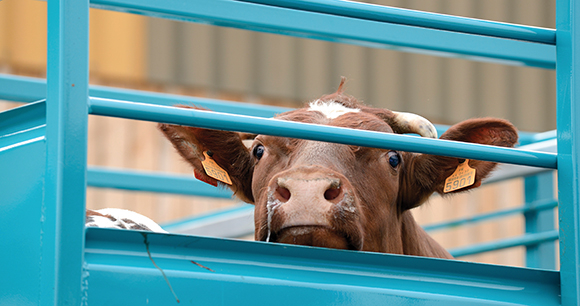
Honolulu, HI—Following years of delays, on October 11 the Hawaii Board of Agriculture will finally consider regulations to protect cattle, sheep, and goats transported via sea vessel between the Hawaiian Islands.
In May, the Animal Welfare Institute (AWI) and nine other animal protection organizations, including five in Hawaii, submitted comments to the Hawaii Department of Agriculture (HDOA) advocating changes to the original draft rules. As a result, the proposed administrative rules now require that containers holding these animals be placed in areas that allow the greatest access to ventilation to limit their exposure to heat and stress. The rules also now restrict the number of animals per container and prohibit injured, ill, lame, blind, or late-stage pregnant animals from being transported.
“The proposed rules are a meaningful first step in protecting the welfare of animals during what is already an extremely stressful time,” said Adrienne Craig, staff attorney for AWI’s farm animal program. “But it’s disappointing to see that the rules do not unequivocally require animals to be loaded last and unloaded first during transport or require that animals waiting to be loaded — often for hours — are provided with shade. Moreover, the rule that animals be given food or water within a 24-hour period does not factor in the time they spend waiting to be loaded. The board needs to strengthen these rules if members truly have the animals’ best interests in mind.”
Had these rules been enacted earlier, they could have prevented the suffocation of 21 cattle on a Young Brothers barge en route from Honolulu to Kauai in December 2019. The cattle suffered a prolonged and preventable death after the carriers placed the animal containers too close together, limiting ventilation. Although the animals were inspected at the port in accordance with existing Hawaii regulations for preventing the transmission and introduction of diseases, no steps were taken to determine if the animals had adequate access to ventilation.
Following this tragedy, AWI urged the state to enact standards of care for the shipment of farm animals. In 2020, the state legislature introduced a number of bills; however, they were held in committee after the Hawaii Department of Agriculture instead committed to adopting administrative rules to address these long-needed basic welfare reforms. Currently, there are only voluntary industry standards and disease-prevention protocols related to the intrastate transport of farm animals. There are no laws or regulations to address animal care or welfare in sea vessel shipment or hold carriers accountable for failing to follow the standards.
“We urge the department to uphold its earlier commitment and for the board to adopt these most modest but critical reforms to protect farm animals from unnecessary suffering or death,” said Inga Gibson, president and policy director for Pono Advocacy in Honolulu.
Marjorie Fishman, Animal Welfare Institute
[email protected], (202) 446-2128
The Animal Welfare Institute (awionline.org) is a nonprofit charitable organization founded in 1951 and dedicated to reducing animal suffering caused by people. AWI engages policymakers, scientists, industry, and the public to achieve better treatment of animals everywhere—in the laboratory, on the farm, in commerce, at home, and in the wild. Follow us on Facebook, Twitter, and Instagram for updates and other important animal protection news.